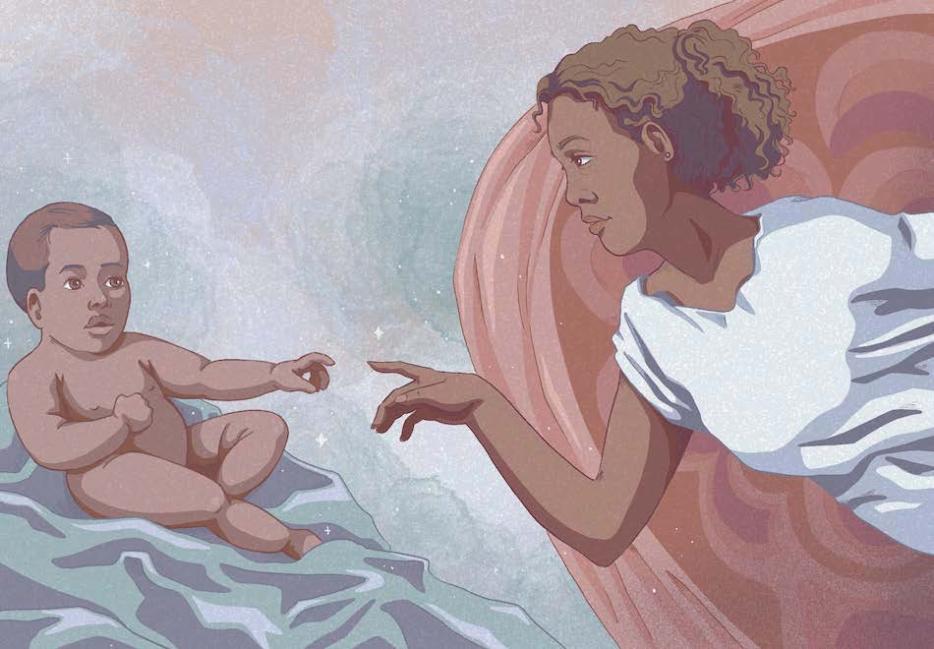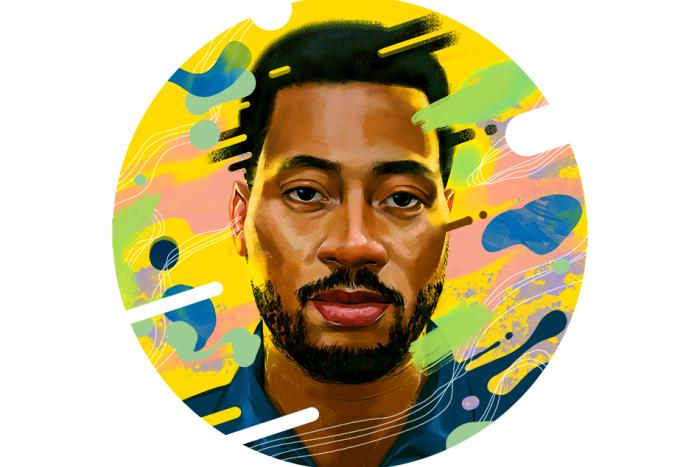Motherhood untethers. It takes you out of your own corporeal vessel. It turns “me” into “we” without so much as a nod to your preparedness or spiritual fortitude. It is the inclement weather event of your humanity. A force of nature so painfully common and yet mythical in its brutality that we can’t help but be in awe of it, countless millennia later. There is no forecast for the storm that rips apart your own flesh and blood, that separates your DNA and repackages itself for another, that drains your blood to pour into a body that you contain but do not own. A protruding belly calls hands to it like the sirens of the sea. The holy waters of your womb push you onto pebbly shores. A name is called that you do not recognize but know is now yours. Every contraction pulls you deeper into yourself until you—the only you you’ve ever known—finally implodes. How many of us experience this? This living death.
I may not have given birth before, but I know how to split myself open. All of us do. Mothers. Women. We know how to sink into the hellfire of ourselves and pull out life.
*
“Push push push push push! Almost there!” Where? Where? Right here. Right here…
*
There is a kind of symphonic lyricism to motherhood. Have you noticed it? From the seasoned, battle-weary mothers warning you of what’s to come to the friends who promise things will still be the same, we all sing our harmonies so well. I wonder how and when we learned these melodies. I wonder who created this chorus. Who decided that women get to be society's sounding board for words that feel like shadows? Flat, dark things clinging to something we can't see or touch. Who hears us? Who hears me at 3 a.m., softly pleading for my son to latch, as my tears fall onto his cheek? Who hears my obsessive repetitions (or are they mantras?) of "slow down" and "careful!" as my son races through the world. Am I talking to myself? What do I sound like?
*
You’re glowing!
How are we feeling?
*
What do I even look like? I wonder what lives on my skin that others can see that I can’t. What do you see in me that tells you I’m already different? Pregnancy is punctuated with doctor's visits where I’m asked questions that I don’t have language for. “How are we feeling?” I don’t really know where me ends and we begins and I wonder if that’s maybe the point. That there is no difference to discern. The fate and feeling of one applies to both. I read a fact, casually written in a pregnancy app, that for the first six months of a baby’s life, they cannot distinguish themselves as a separate entity from their mother. In our most new, cherished, and untouched mind, mother and child are one and the same. A blending of flesh and blood and an infinite loop of miracles. No wonder I’m glowing.
*
How’s baby doing?
*
“How’s baby doing?” not “How’s the baby?” as if mine is the only one in the world. To me, he is. All children are the only ones to their mothers, I think. Entire words disappear from sentences now, like the sides of a cliff face succumbing to the ocean. As if mothers have no need for all this superfluous language in the new world they’re entering. There’s no time for it. No time to hold in your throat the saccharine weight of idle conversation. Your words matter so much more now. Positive affirmations are less about a quick morale boost to start your day than they are about building the foundations of the newest human. The kicks that knock the wind out of me remind me that there’s someone else in the room. Watch your language.
I find the time preparing for maternity leave to be almost comical in its overwhelm. The words maternity leave become a conduit for my meaning. I am leaving. I am preparing to walk out of one world and into another. Everyone knows this, too. I can see it in their eyes, the way they watch and worry and pity and envy. You get to leave. You also get to come back. The bigger I get, the brighter the exit sign burns. Say your parting words now before it’s too late. They are ominous in their vague, riddle-like cadences. “Just you wait,” they say in the awkward minutes before the start of Zoom meetings, where compulsion to extinguish the silence with perfunctory words is normal. “If you think you’re tired now, just you wait until the baby gets here.” I laugh. Why do I laugh? I feel nervous. No. I feel annoyed. I was smiling before; excited even. These words are happening more frequently now. I’m beginning to wonder if they’re threats.
*
Just you wait—
Till the baby gets here—
Till they’re talking—
Till they’re walking—
Till they’re teenagers—
Wait.
Wait.
Wait.
*
What they don’t tell you about birth is that there’s a lot of waiting. Bizarrely uncomfortable gas-like pains visit every thirty minutes for a couple hours exactly, until your brain realizes what’s going on. Oh—this is it. It’s happening. I go to the doctor and learn I'm in pre-labour (hasn’t this whole thing been pre-labour?). Go home, I’m told. It could happen today or in another two weeks. Rest. Try and get comfortable. “Any shortness of breath?” “Yes. Always.”
Labour and Delivery hospital wards are like their own planets. Extraterrestrial events occur so casually here that I decide it must be an entirely different universe. I labour for hours, breathing through the contractions. A warm shower is the only thing that brings me relief. I relish the cliché of this. It makes me smile as I imagine my son spending his last hours safe and protected in our waters, whispering promises of forgiveness and completion soon.
*
Deep breaths.
Easy does it. That’s it.
If you feel like you need to push, I need you to try and stop.
Push! Push! Push!
No, not like that.
*
The labour and delivery nurse cheers me on and tries to correct my pushing technique. I should’ve listened. I should listen more.
I worry about my hearing these days. They say that during pregnancy, a woman’s sense of smell is heightened, but since giving birth I can hear everything. Newborns are loud. Did you know that? I didn’t. They make so much noise when they sleep. And then there’s the crying. Their cry is biologically designed to stir your most primal response. Your breasts flow heavy and thick with milk. I hear him cry and immediately feel my breasts tighten and my nipples leak, revealing my true identity: I am a mother now. My body was designed for his. Or is it more like my body was designed by his? I shower and swear that I can hear my son crying for me. It’s not so much a hearing as it is a knowing. Because I know things now, don’t I? I can almost touch the imperceptible difference in the way other mothers look at me. They see me and I see them. We are in a different place together. Hearing. Knowing. I turn the shower off. And my ears confirm what I already knew. I check the time. One o’clock. I wonder what it is this time. Hungry? Sleepy? I look in the mirror and see my own tears.
“Wake up, wake up. You’re crying in your sleep again.” Oh. I thought it was the baby.
Snow under boots. Leaves under stomping feet. My back under the weight of you.
Motherhood is crunchy. There is a sonic weight to it. It makes noise. Like eating potato chips in a quiet room, I am painfully aware of how loud this benign event is. But can others hear it too or does it only thunder in my head?
*
"Are you breastfeeding?”
“Do it for as long as you can."
"That's too long."
*
I know the difference between a hungry cry and a sleepy cry. I know when he’s too warm or cold. I smile when I hear someone say “Mother knows best,” because now I understand that my son has invited me into his world. I only know what is shared. My son’s laughter feels so perfectly tuned to my ear. I wonder if a child’s laughter is like a fingerprint. I’d know his anywhere. I could pick it out even without hearing it, which, of course, doesn’t make sense to most reasonable people but that doesn’t matter because I am no longer reasonable.
Motherhood is all the rage, they say. But I want to tell them that motherhood is rage. It is a love so perfectly and divinely crystallized that it has transformed into the collision of will and fate and joy. My son. Me. Simultaneously and miraculously one but always—urgently, fervently, and purposefully—two. The surge of my bloodstream is alive in someone else now. I am multiplied and fractured and whole. I am the sound of a mother. Nothing sounds like me.
*
Gentle, sweetheart.
Go slow.
Be careful.
*
Am I talking to myself or my child? Is there a difference?
I wonder what postpartum was like for the Virgin Mary. I wonder what she feared, what guilt looked like for her when the entire world knows you only as Mother. The first. Her child was meant to save us. Motherhood was her assignment. And maybe it’s ours, too. Our children aren’t supposed to save us, but they do. They do, don't they? They assign you to what is right, what is difficult and true. Which is to say, they assign you back to yourself. There is much to be lost in the transition but children whisper to you that you have always belonged to yourself. You get to choose who you are. Motherhood is a storm and you are its maker. Every thunder snap and lightning strike is a paving. You are coming. You have always been here. You. First.
*
Are you struggling?
I whisper back: Yes. Thank God. Thank God.
*
Labour, as I know it now, doesn’t end. Not really. Each milestone of your child’s life is a milestone in your own too. The end of one difficult phase—bottle weaning, sleeping through the night, teething, nap dropping, first day of daycare—is greeted by the next. We are always labouring forward, blurry eyed and certain. The cries and laughter of mother and child become intertwined totems of sound. Motherhood is relentless and a blip. I know that now. Together and separately, we are.
*
Deep breaths.
Not that much longer to go.





